Message Of the Land send
现代大学英语精读1UNIT3_Message_of_the_Land__课文翻译
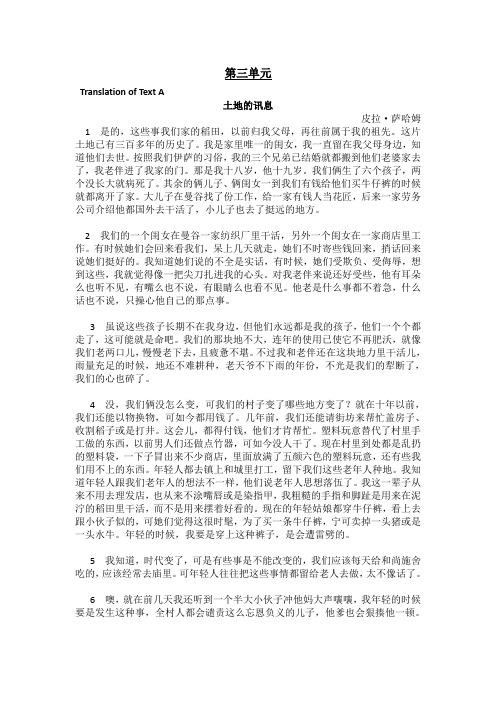
第三单元Translation of Text A土地的讯息皮拉·萨哈姆1 是的,这些事我们家的稻田,以前归我父母,再往前属于我的祖先。
这片土地已有三百多年的历史了。
我是家里唯一的闺女,我一直留在我父母身边,知道他们去世。
按照我们伊萨的习俗,我的三个兄弟已结婚就都搬到他们老婆家去了,我老伴进了我家的门。
那是我十八岁,他十九岁。
我们俩生了六个孩子,两个没长大就病死了。
其余的俩儿子、俩闺女一到我们有钱给他们买牛仔裤的时候就都离开了家。
大儿子在曼谷找了份工作,给一家有钱人当花匠,后来一家劳务公司介绍他都国外去干活了,小儿子也去了挺远的地方。
2 我们的一个闺女在曼谷一家纺织厂里干活,另外一个闺女在一家商店里工作。
有时候她们会回来看我们,呆上几天就走,她们不时寄些钱回来,捎话回来说她们挺好的。
我知道她们说的不全是实话,有时候,她们受欺负、受侮辱,想到这些,我就觉得像一把尖刀扎进我的心头。
对我老伴来说还好受些,他有耳朵么也听不见,有嘴么也不说,有眼睛么也看不见。
他老是什么事都不着急,什么话也不说,只操心他自己的那点事。
3 虽说这些孩子长期不在我身边,但他们永远都是我的孩子,他们一个个都走了,这可能就是命吧。
我们的那块地不大,连年的使用已使它不再肥沃,就像我们老两口儿,慢慢老下去,且疲惫不堪。
不过我和老伴还在这块地力里干活儿,雨量充足的时候,地还不难耕种,老天爷不下雨的年份,不光是我们的犁断了,我们的心也碎了。
4 没,我们俩没怎么变,可我们的村子变了哪些地方变了?就在十年以前,我们还能以物换物,可如今都用钱了。
几年前,我们还能请街坊来帮忙盖房子、收割稻子或是打井。
这会儿,都得付钱,他们才肯帮忙。
塑料玩意替代了村里手工做的东西,以前男人们还做点竹器,可如今没人干了。
现在村里到处都是乱扔的塑料袋,一下子冒出来不少商店,里面放满了五颜六色的塑料玩意,还有些我们用不上的东西。
年轻人都去镇上和城里打工,留下我们这些老年人种地。
现代大学英语精读第一册 Unit 3 The Message of the Land 课文重点单词和短语的课文例句 测试题

Unit 3 The Message of Land1.Only ten years ago, you could things, but now it’s all.2.The soft cool moves the , which like waves of gold.3.Why, t hey sell their pigs or water buffalo just to buy jeans.4.Shops have , plastic things and goods that we_____5.* I have been her all these year, yet she had not once anything.6.If that kind of thing had happened when I was young, the whole village would have__________such an son, and his father would surely have given him a good beating.7.My children grew up on it, and .8.Plastic things village .9.Yes, this dressed can still plant and frommorning till dusk.10.Our son got a job as a gardener in a rich man’s house in Bangkok but later an_________________ sent him to a foreign land to work.11.I don’t talk about what I know because I know too much. I know for example, ________,anger, and _______are the root all _________.12.Our piece of land is small, and it is _____________fertile, bleeding , andlike us, getting old and.13.Now young girls jeans, and look like boys and they think it is .14.Maybe it’s that send them away from us.15.It my parents and16., my wife is still with me, and both of us are still strong.17.All my life, I have never had to go to the , or to paint my lips or nails.18.W ounds over time.19.He gave me six children, and two died ___________ from ./Sickness , and we again.20.Sometimes, they and it is like a knife my heart.21.Plastic bags the village.22.we should offer food to everyday, go to the temple regularly.23.but in a bad year, it’s not only the that break, but our hearts, too.24.It’s good to smell the in November.25.Disease, injuries, hardship and __________ have always been part of my life.26.All of them remain my children their long absence.27.For years, this has belonged to our family.28.One of our daughters is working in a factory, and the other has a job in a store.29.These rough fingers and are for working in mud of our , not forlooking pretty.Useful Expressions (Idioms/ Verb Phrases):1.My ears do hear--- they hear more than me.2.Men make things with bamboo pieces, but ____________.3.When each of them has jeans, they are off . // They comehome to see us , stay a few days, and then they again.4.me, I wouldn’t change, couldn’t change I wanted to.5.I am at peace with the land and the conditions of my life.6.My husband moved into our house as us in Esarn.7.in a certain way:8., if I were to like they do now, would strike me.9.They come home to see us , stay a few days, and then they again.10.Now they will do it ______________ you have money to pay.Verb Phrases:11.But I my wife.12.his question has never me.13.I hope one of my children comes back one day to live, and gives me grandchildren so that Ican the land’s secret messages to them.14.My children grew up on it, ___________ and _______________.15.He has always been patient and silent, ______________.16.All my life, I have never had to go to the__________, or to __________.。
Unit3 Message of the Land现代大学英语精读1[优质PPT]
![Unit3 Message of the Land现代大学英语精读1[优质PPT]](https://img.taocdn.com/s3/m/d30434a0f8c75fbfc77db262.png)
Bangkok
Bangkok is the economic center of Thailand. Tourism is a major source of
17
Thai Buddhism
Buddhism is Thailand's main religion. 94% of Thai people are Buddhist. Buddhism is linked with the historical Indian prince, Siddharta Gautama ( 释 迦 牟 尼 ) , who became the Buddha and reached the enlightenment. Now his teachings are still followed. His teachings say that people suffer because they are attached to material things, to women or men by heart links. These links cause suffer, jealousy and pain. People are never satisfied, i.e. they want more money, more power. The aim of Buddhism is to get rid of these pains and of these links.
Unit 3 Message of the Land

Unit 3 Message of the LandPira SudhamTeaching objectives:1.To expand basic vocabulary and expressions2.To appreciate the theme of the text3.To know about some background information about the author --- Pira Sudham.4.To review the grammatical knowledge about ways of expressing unreal conditional clauses (present)Key points:nguage study and expressions2.Background information3.Word Building: -en, -able, un-, re-, fore-.4.Paraphrases of difficult sentencesDifficult point:1.ways of expressing unreal conditional clauses (present)2.Writing devices: Simile, MetaphorPart I Warm-upI. Warm-up Questions1. What kind of people do you think the farmer and his wife are? What finequalities do you find in them?2. What do you think is the land’s secret message the farmer wants to pass to hisgrandchildren?Part II Background InformationI.AuthorPira Sudham is considered Thailand's leading English language writer, who was nominated for the 1990 Nobel Prize for Literature.His literary works are concerned with social-economic-political changes occurring in Thailand.Widely read and highly acclaimed, his books have given an expedient voice to the poor and the voiceless.II.Thai BuddhismBuddhism is Thailand's main religion. 94% of Thai people are Buddhist. The other are Muslim, Catholic or Chinese. Buddhism was born 2,546 years ago (the official year in Thailand is the year 2003 and the traditional year is the year 2546). Buddhism is linked with the historical Indian prince, Siddharta Gautama, who became the Buddha and reached the enlightenment. Now his teachings are still followed. His teachings say that people suffer because they are attached to material things, to women or men by heart links. These links cause suffer, jealousy so pain. People are never satisfied, i.e. they want more money, more power. The aim of Buddhism is to get rid of these pains and of these links. There are several kinds of Buddhism. Thai Buddhism is called Theravada Buddhism.III.Part III Text AppreciationI.Text analysis1. ThemeThe text tells about the deep regret of the old people over the loss of traditional values and the way of life.2. StructurePart 1 (para. 1-7):the wife’s speech:The wife tells us briefly about her family and how all her children left.This par t focuses on the changes that she finds she can’t adjust to.Part 2 (paras.8-11): the farmer’s speech:The farmer tells about what he thinks are the root of all evils and what joys he finds in life and farming.Question 1: What’s the message of the land?It’s our history, our culture, our tradition and our life. In a word, it is our root which we cannot live without.Question 2: Why does the wife start her conversation with the talk about the land?The wife has already regarded the land as part of her life. This is the land where her parents and forefathers lived and it is bound with family history and tradition. It represents the root of her family.Question 3: Question: What’s the main idea of Paras. 1—3?The wife makes a brief introduction of her family and tells us how all her four children left for cities. She feels sorry about this and she also feels sorry about the land. The land is no longer fertile, like her and her husband, getting old and exhausted.Question 4: What is the main idea of Paras. 5—6?What is the function of the first sentence in Para. 5?With the first sentence in Para. 5 serving as a transitional sentence, the wife shifts her talk to the things that should not change, which include people’s worship, and you ng people’s respect to their parents and the aged.Question 5:How does the wife present her speech? What is her attitude toward the changes around her?By comparison/contrast and exemplification, the wife presents her idea of this changing world. She di slikes the changes around her. She won’t accept the changes and even refuses to change with the life.Writing devices: MetaphorA metaphor is also a comparison. The difference is that a simile compares things explicitly—that is, it states literally that X is like Y.A metaphor compares things implicitly. Read literally, it does not state that things are alike; it says that they are the same thing, that they are identical.1.The soft cool breeze moves the sheaves, which ripple and shimmer like waves ofgold. (11)2.Yes, this bag of bones dressed in rags can still plant and reap rice from morningtill dusk. (7)II.Sentence paraphrase1. My husband moved into our houses as is the way with us in Esarn. (1)(When we got married) my husband came to live in our house. It was the tradition here in Esarn that the bridegroom should come to live with the bride’s family.2.The rest, two boys and two girls, went away as soon as we could afford to buy jeans for them. (1)Our other children—two boys and two girls—left as soon as we had the money to buy them jeans.3.It’s easier for my husband. He has ears which don’t hear, a mouth which doesn’tspeak, and eyes that don’t see. (2)News about my children’s problems doesn’t make my husband as sad as me. He doesn’t bother about what is happening around us and to our children. He never says anything about them.4. He has always been patient and silent, minding his own life. (2)He’s always been patient and talks little. He just does his duty and carries on his life.5. Our piece of land is small, and it is no longer fertile, bleeding year after year and, like us, getting old and exhausted. (3)Our land is getting poorer with each passing year, like us who are getting old, weak and tired.6.…but in a bad year, it’s not only the ploughs that break but our hearts too. (3) …but when there is a drought, the land is so hard that the ploughs break. And we become very, very sad.7. Shops have sprung up, filled with colorful plastic things and goods we have no use for. (4)Many shops appear in a short time. In these shops there are lots of colorful plastic things and things that are useless for us.8If that kind of thing had happened when I was young, the whole village would have condemned such an ungrateful son, and his father would surely have given him a good beating. (6)In my day if a boy had screamed at his mother, the whole village would have scolded him for his lack of gratitude, and his father would certainly have punished him.9. Yes, this bag of bones dressed in rags can still plant and reap rice from morning till dusk. (7)It’s true I’m not strong and my clothes are full of holes, but I can still work in the rice fields all day.10. It’s good to smell the scent of ripening rice in November. The soft cool breeze moves the sheaves, which ripple and shimmer like waves of gold. (11)The ripening rice is so pleasant to smell in November. In the soft cool breeze, the sheaves move and shine in the sun like a golden sea.Phrases and Expressions1.now and then2.mind one’s own…3.in spite of4.barter… for5.spring up6.tend to7.give sb. a (good/… ) beating8. as for9. occur to10. a bag of bones11. in rags12. at peace with13. tie... down14. bird/etc. on the wing15. pass… on toII WritingWrite a composition on the following topic: Do You Agree With the Secret of Land ?1.In the first paragraph, state your view.2.In the second paragraph, support your view with details.3.In the third paragraph, bring what you have written to a natural conclusionwith a summary or suggestion.。
土地的讯息(Message of the Land译文)

土地的讯息是的,这些都是我们的稻田。
它们曾属于我的父母和祖辈。
这片土地有三百多年的历史了。
我是家里唯一的女孩。
所以,我一直陪在父母身边直到他们去世。
我的三个兄弟结婚以后就都搬到他们的女人家里去了。
按照我们伊萨恩的风俗,我男人进了我们家的门。
那时我18岁,他19岁。
我们生了六个孩子,有两个孩子在襁褓中就病死了,剩下的两个男孩和两个女孩在我们能为他们买得起牛仔裤的时候,就离开了家门。
我的大儿子在曼谷的一个有钱人家里做圆丁,后来一家劳务所介绍送他到国外干活去了。
我的小儿子离家也很远。
我们的一个女儿现在在曼谷的一家纺织厂上班,另一个女儿在一家商店里工作。
他们偶尔回家来看我们,待上几天就又走了。
他们经常寄钱给我们并告诉我们他们过得很好。
我知道这并不全是真的。
有时,(当我知道)它们受欺负受侮辱时,我就心如刀割。
而这一切对于我的男人来说就好过些,他有一对听不见的耳朵、一张不说话的嘴和一双看不见的眼睛。
他总是不紧不慢,沉默寡言,自个儿过日子。
虽然孩子们长时间不在家,但他们始终是我的孩子,也许是命运让他们离开了我们。
我们的这片土地很小,也不再肥沃,就像我们一样,一年年地被榨干了血,慢慢上了年纪,渐渐精疲力竭了。
而我和我的男人还在这片土地上耕作。
当雨水多的时候土地还不难耕种,可要是赶上干旱,干硬的土地不仅使我们的犁耕碎了,我们的心也碎了。
是的,我们两口子一直没怎么变,可是我们的村子却变了很多。
怎么变了?就在十年前你还可以和别人换东西,可现在就得用现金了。
几年前你还可以喊你的邻居们帮你盖房子、割麦子或挖口井。
但现在只有付钱给他们,他们才干。
塑料制品代替了村里的手工做的东西。
过去男人们常常用好的竹简做东西,但现在已经不再做了。
塑料袋扔的村里哪儿都是。
还突然冒出些商店,里面摆满了五颜六色的塑料制品和对我们没有用的东西。
年轻人离开了家去了城镇,留下我们这些上了年纪的人种田。
我知道他们的想法和我们不同,他们说我们岁数大的人跟不上时代。
现代大学英语 Unit 3 message of the land

IV. Monks in Thailand
Lesson 3 - Message of the Land
I.
Author
Pira Sudham was born in a poor family in 1942 in rural Esarn. He spent his childhood in the rice fields on the Korat Plateau, helping his parents and tending a herd of buffaloes until he went to Bangkok at the age of fourteen to be a servant to monks in a Buddhist temple where he was also admitted to a school. To support himself through high school and the first year at the Faculty of Arts Chulalongkorn University, he sold souvenirs to tourists until he won a New Zealand government scholarship to study English literature at Auckland University and later at Victoria University, Wellington.
Lesson Three
Message of the land
Pira Sudham
Book 1
Teaching Procedures
1 2 3
Warm-up Background information
Lesson 3 Message of the land
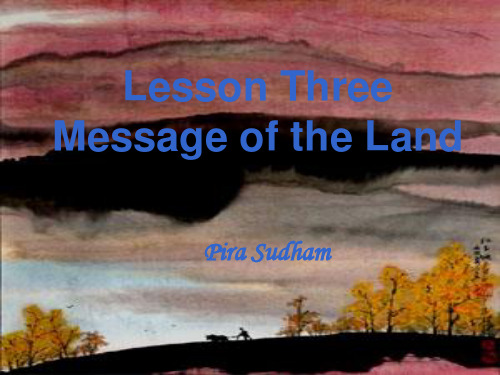
Pira Sudham
The Author
Pira Sudham is considered Thailand's leading English language writer, who was nominated for the 1990 Nobel Prize for Literature. His literary works are concerned with social-economicpolitical changes occurring in Thailand. Widely read and highly acclaimed, his books have given a voice to the poor and the voiceless.
Buddhism
Buddhism is Thailand's main religion. 94% of Thai people are Buddhist. The other are Muslim, Catholic or Chinese. The teachings say that people suffer because they are attached to material things, to women or men by heart links. These links cause suffer, jealousy and pain. People are never satisfied, i.e. they want more money, more power. The aim of Buddhism is to get rid of these pains and of these links.
message of the land文章
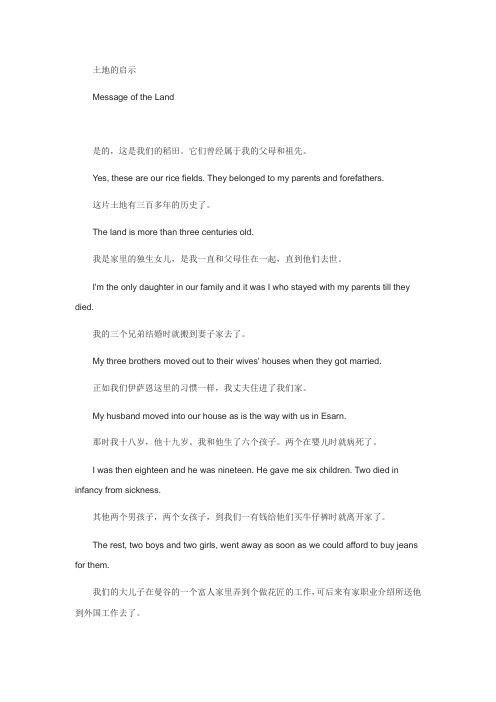
土地的启示Message of the Land是的,这是我们的稻田。
它们曾经属于我的父母和祖先。
Yes, these are our rice fields. They belonged to my parents and forefathers.这片土地有三百多年的历史了。
The land is more than three centuries old.我是家里的独生女儿,是我一直和父母住在一起,直到他们去世。
I'm the only daughter in our family and it was I who stayed with my parents till they died.我的三个兄弟结婚时就搬到妻子家去了。
My three brothers moved out to their wives' houses when they got married.正如我们伊萨恩这里的习惯一样,我丈夫住进了我们家。
My husband moved into our house as is the way with us in Esarn.那时我十八岁,他十九岁。
我和他生了六个孩子。
两个在婴儿时就病死了。
I was then eighteen and he was nineteen. He gave me six children. Two died in infancy from sickness.其他两个男孩子,两个女孩子,到我们一有钱给他们买牛仔裤时就离开家了。
The rest, two boys and two girls, went away as soon as we could afford to buy jeans for them.我们的大儿子在曼谷的一个富人家里弄到个做花匠的工作,可后来有家职业介绍所送他到外国工作去了。
Our oldest son got a job as a gardener in a rich man's home in Bangkok but later an employment agency sent him to a foreign land to work.我另一个儿子也去了很远的地方。
Unit3 Message of the land
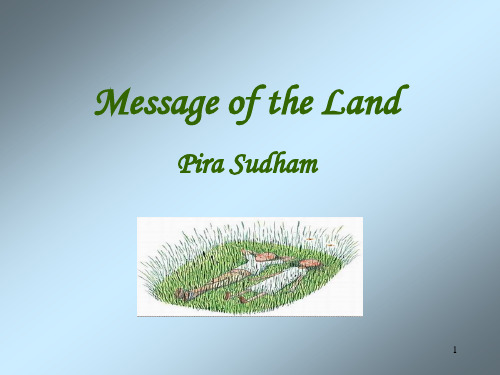
12
About the Text Figures of Speech
Simile: A simile is a brief comparison , usually :
introduced by the preposition “like” or the 明喻) (明喻) conjunction “as”, and etc. A simile consists of two parts: tenor and vehicle. The tenor is the primary subject; the vehicle is the thing to which the main subject is compared to.
About the Author
The Force of Karma This sequel to Monsoon Country covers the tumultuous (骚乱的) years of the economic crisis, the political upheavals and the massacre of May 1992, right up to the beginning of the year 2002.
Message of the Land
Pira Sudham
1
Message of the Land
Pira Sudham About the Author: background / works /comments / map About the Text figures of speech / word study / understanding In-class Discussion After-class Activities
Message of the Land by Pira Sudham

Message of the Land by Pira SudhamPARA.1 Yes, these are our rice fields. They belonged to my parents and forefathers. The land is more than three centuries old. I'm the only daughter in our family and it was I who stayed with my parents till they died. My three brothers moved out to their wives' houses when they got married. My husband moved into our house as is the way with us in Esarn. I was then eighteen and he was nineteen. He gave me six children. Two died in infancy from sickness. The rest, two boys and two girls, went away as soon as we could afford to buy jeans for them. Our oldest son got a job as a gardener in a rich man's home in Bangkok but later an employment agency sent him to a foreign land to work. My other son also went far away.PARA.2 One of our daughters is working in a textile factory in Bangkok, and the other has a job in a store. They come home to see us now and then, stay a few days, and then they are off again. Often they send some money to us and tell us that they are doing well. I know this is not always true. Sometimes, they get bullied and insulted, and it is like a knife piercing my heart. It's easier for my husband. He has ears which don't hear, a mouth which doesn't speak, and eyes that don't see. He has always been patient and silent, minding his own life.PARA.3 All of them remain my children in spite of their long absence. Maybe it's fate that sent them away from us. Our piece of land is small, and it is no longer fertile, bleeding year after year and, like us, getting old and exhausted. Still my husband and I work on this land. The soil is not difficult to till when there is a lot of rain, but in a bad year, it's not only the ploughs that break but our hearts, too.PARA.4 No, we two haven't changed much, but the village has. In what way? Only ten years ago, you could barter for things, but now it's all cash. Years ago, you could ask your neighbors to help build your house, reap the rice or dig a well. Now they'll do it only if you have money to pay them. Plastic things replace village Men used to make things with fine bamboo pieces, but no longer. Plastic bags litter the village. Shops have sprung up, filled with colorful plastic things and goods we have no use for. The young go away to towns and cities leaving us old people to work on the land. They think differently, I know, saying that the old are old-fashioned. All my life, I have never had to go to a hairdresser, or to paint my lips or nails. These rough fingers and toes are for working in the mud of our rice fields, not for looking pretty. Now young girls put on jeans, and look like boys and they think it is Why, they are willing to sell their pig or water buffalo just to be able to buy a pair of jeans. In my day, if I were to put on a pair of trousers like they do now, lightning would strike me.PARA.5 I know, times have changed, but certain things should not change. We should offer food to the monks every day, go to the temple regularly. Young people tend to leave these things to old people now, and that's a shame.PARA.6 Why, only the other day I heard a boy shout and scream at his mother. If that kind of thing had happened when I was young, the whole village would have condemned such an ungrateful son, and his father would surely have given him a good beating.As for me, I wouldn't change, couldn't change even if I wanted to. Am I happy or unhappy? This question has never occurred to Life simply goes on. Yes, this bag of bones dressed in rags can still plant and reap rice from morning till dusk. Disease, wounds, hardship andscarcity have always been part of my life. I don't complain.PARA.8 The farmer: My wife is wrong. My eyes do see–they see more than they should. My ears do hear–they hear more than is good for me. I don't talk about what I know because I know too much. I know for example, greed, anger, and lust are the root of all evils.PARA.9 I am at peace with the land and the conditions of my life. But I feel a great pity for myI have been forcing silence upon her all these years, yet she has not once complained of anything.I wanted to have a lot of children and grandchildren around me but now cities and foreign lands have attracted my children away and it seems that none of them will ever come back to live here again. To whom shall I give these rice fields when I die? For hundreds of years this strip of land has belonged to our I know every inch of My children grew up on it, catching frogs and mud crabs and gathering flowers. Still the land could not tie them down or call them back. When each of them has a pair of jeans, they are off like birds on the wing.PARA.11 Fortunately, my wife is still with me, and both of us are still strong. Wounds heal over time. Sickness comes and goes, and we get back on our feet again. I never want to leave this land. It's nice to feel the wet earth as my fingers dig into the soil, planting rice, to hear my wife sighing, "Old man, if I die first, I shall become a cloud to protect you from the sun." It's good to smell the scent of ripening rice in The soft cool breeze moves the sheaves, which ripple and shimmer like waves of gold. Yes, I love this land and I hope one of my children comes back one day to live, and gives me grandchildren so that I can pass on the land's secret messages to them.AnalysisThese 12 themes are mainly about the members of the family, indicate that the whole passage is a introduction to the woman’s family---- her elder generalization, her gerneralization and younger gerneralization. As the opening paragraph of the article, most of this paragraph’s themes are concret and arranged in good order, give readers enough information as well as imagination.This paragraph can be devided into two parts. The first part mainly tells their two daughters, their hard city lives. The second part is of the woman’s husband. Using “they”, “often”, “sometimes”these three themes, the auther depicts their lives vividly. Of the second part, two “he”s emphasize that the woman find it is hard to understand her husband’s indifference of these kind of things.The “maybe”, “still” are pulled forward to the purpose of emphasis.This paragraph talks about the change of the village, of the younger generalization and the unchange of the couple. The theme vary from “only ten years ago”, “years ago”to“now” shows the change of the villiage and the striking contast of the past and the present condition. There are 15 themes here and 6 themes are concerning with the time, which is quite impresssive.These three themes are two pronouns and one noun..The word “why” questions the following sentence, but without a question mark. It emphasizes the woman’s astonishment.It uses the “yes”as a theme for the second time. The sixth theme is of four words,gives a impression of heavy suffering.This paragraph correspands to the woman’s comments on her husband. The repeating use of “my ~” and “I” contrast with the two “he”s.The paragraph is also part of the husband’s narration. Frequent use of pronoun “I”sets a personally narrative atmosphere.This paragraph has various themes, but as I noticed, the rhemes are mostly about the “land” and the “children”. This emphasize the topic of this paragraph, of the relationship between land and the children of the couple.“wounds” , “sickness”and two “it”s emphasize the couple’s love towards their land. As for the last theme “yes”, it recalls the very first theme of the whole article to my mind, and the rhemes of the two sentences are mainly the same—the land. The auther use this method to intensify the topic and create a profound impression.As for the rhemes of each sentences, I found they usually contains lots of imformmation. Some of them quickly become the next sentences’theme, sometimes one rheme remains in several sentences. They usually function as providing imformation as well as deriving the next theme at the same time. The theme, on the other hand, is the topic, rheme always somewhat concern to it.。
现代大学英语Unit-3-message-of-the-land--课文详解

Lesson 3-Message of the Land
1. Your father, a proud and unbending man, refused all help that was offered him.
2. Playing football, his only interest in life, brought him many friends.
to have enough money to do
Our other children—two boys and two girls—left as soon as we had the money to buy them jeans.
go to 3
Examples
Sentence Paraphrase
土豪 横行霸道,恃强欺弱 绝妙的主意 极其丰盛的饭菜 干得好! (受人雇佣且尤指与政治 集团有关的)流氓,打手
Translation
Word Study
Lesson 3-Message of the Land
5. insult
v. to offend someone by saying or doing
sth.
c. (fml.) to ห้องสมุดไป่ตู้rovide; give
a afford a new car b afford this high price
a afford the rent
c afford a clue to
c afford a chance c afford a pleasant shade
Sentence Paraphrase 1
My husband moved into our houses as is the way with us in Esarn. (1)
Unit Three --- text A Message of the Land
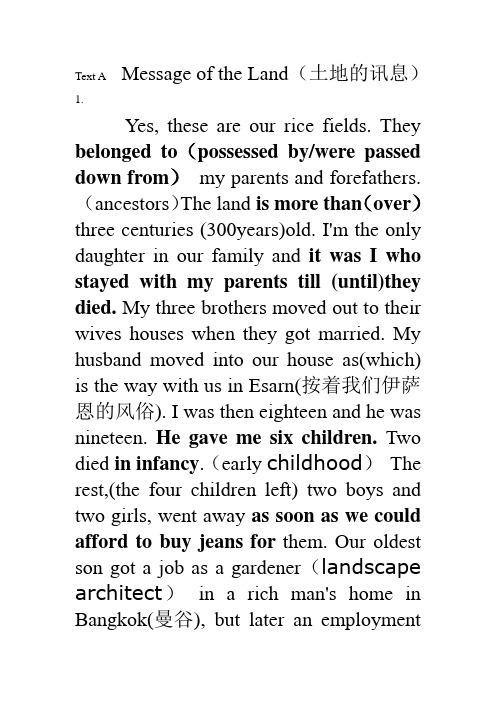
Text A Message of the Land(土地的讯息)1.Yes, these are our rice fields. They belonged to(possessed by/were passed down from)my parents and forefathers. (ancestors)The land is more than(over)three centuries (300years)old. I'm the only daughter in our family and it was I who stayed with my parents till (until)they died. My three brothers moved out to their wives houses when they got married. My husband moved into our house as(which) is the way with us in Esarn(按着我们伊萨恩的风俗). I was then eighteen and he was nineteen. He gave me six children. Two died in infancy.(early childhood)The rest,(the four children left) two boys and two girls, went away as soon as we could afford to buy jeans for them. Our oldest son got a job as a gardener(landscape architect)in a rich man's home in Bangkok(曼谷), but later an employmentagency sent him to a foreign land to work. My other son also went far away.() 2.One of our daughters is working in a textile factory in Bangkok, and the other has a job in a store. They come home to see us now and then,(sometimes)stay a few days, and then they are off(leave)again. Often they send some money to us and tell us that they are doing well. I know this is not always true. Sometimes, they get bullied(intimidated/treated unfairly) and insulted, and it is like a knife piercing (stabbing/cutting)my heart.(making me very sad.) It's easier for my husband. He(my husband)has ears which don't hear, (deaf)a mouth which doesn't speak, (mute)and eyes that don't see. (blind)He(my husband)has always been patient and silent, minding(paying attention to) his own life.3.All of them(children)remain (are)my children in spite of their long absence. Maybe it's fate(destiny/something decided by God)that sent them away from us. Our piece of land is small, and it is no longer fertile(rich, productive), bleeding year after year and, like us, getting old and exhausted. Still my husband and I work on this land. The soil is not difficult to till (plow,prepare for crops)when there is a lot of rain, but in a bad year,(drought year) it's not only the ploughs that break, but our hearts, too.4.No, we two haven't changed much, but the village has. In what way? Only ten years ago, you could barter for (exchange goods or services)things, but now it's all cash. Years ago, you could ask your neighbors to help build your house, reap (harvest/gather crops)the rice or dig a well. Now they’lldo it only if/if only you have money to pay them. Plastic things replace village crafts. (object produced by skillful handwork)Men used to make things with fine(very small) bamboo pieces, but no longer. Plastic bags litter (cover place with scattered objects)the village. Shops have sprung up,(appeared in great numbers/emerged)filled with colorful plastic things and goods we have no use for. The young go away to towns and cities leaving us old people to work on the land. They think differently, I know, saying that the old are old-fashioned. All my life, I have never had to go to a hairdresser, or to paint my lips or nails. These rough(coarse/not smooth)fingers and toes are for working in the mud of our rice fields, not for looking pretty. Now young girls put on (wear)jeans, and look like boys andthey think it is fashionable. Why, they are willing to sell their pig or water buffalo just to be able to buy a pair of jeans. In my day, if I(wife)were to put on a pair of trousers like(as) they do now, lightning (flash of lightning)would strike (hit)me.5.I know, times have changed, but certain things should not change. We should offer food to the monks(man living in a religious community) every day, go to the temple regularly. Young people tend to leave these things to old people now, and that's a shame(state of disgrace).6.Why, only the other day I (wife)heard a boy shout and scream at his mother. If that kind of thing had happened when I was young, the whole village would havecondemned(criticized/consider somebody guilty) such an ungrateful (not appreciative)son, and his father would surely have given him a good beating.7.As for me, I wouldn't change, couldn't change even if I wanted to. Am I happy or unhappy? This question has never occurred to (I never thought about it.)me. Life simply goes on. Yes, this bag of bones(my body)dressed in rags can still plant and reap rice from morning till dusk.(from morning till night) Disease, injuries, hardship and scarcity(lack of money,food,things) (shortage)have always been part of my life. I don't complain.(express unhappiness about something)8.The farmer: (husband)My wife is wrong. My eyes do see--they see morethan they should. My ears do hear--they hear more than is good for me. I don't talk about what I know because I know too much. I know for example, greed, anger, and lust (sexual desire)are the root of all evil.(sin, vice)9.I am at peace with the land and the conditions of my life. But I feel a great pity for my wife. I have been forcing silence upon her all these years, yet she has not once complained of anything.10.I wanted to have a lot of children and grandchildren around me but now cities and foreign lands have attracted my children away and it seems that none of them will ever come back to live here again. To whom shall I give these rice fields when I die? For hundreds of years this strip of(piece of) land has belonged to our family. I know every inch of it. Mychildren grew up on it, catching frogs and mud crabs(蟹)and gathering flowers. Still the land could not tie them down (restrict/prevent somebody from going away)or call them back. When each of them has a pair of jeans, they are off like birds on the wing.(flying)11.Fortunately, my wife is still with me, and both of us are still strong. Wounds heal over time. Sickness comes and goes, and we get back on our feet again.(be healthy)I never want to leave this land. It's nice to feel the wet earth as my fingers dig into the soil, planting rice, to hear my wife sighing, "Old man, if I die first, I shall become a cloud to protect you from thesun." It's good to smell the scent of ripening rice in November. The soft cool breeze(light to moderate wind)moves the sheaves, (a bundle of the harvested stalks of a plant, especially wheat, barley, or another cereal, with the heads still containing their seeds)which ripple (flow in tiny gentle waves)and shimmer(shine with a wavering light)like waves of gold. Yes love this land and I hope one of my children comes back one day to live, and gives grandchildren so that I can pass on (hand over)the land's secret messages to them.1. About the author and the textPira Sudham (1942--) is a leading English language writer in Thailand. He was born to a poor family in rural Esarn, in the northeast of the country. At the age of 14, he traveled to Bangkok to become a templeboy, a servant to the monks. He continued to study and won entrance to Thailand's top university, Chulalongkorn. He later won a New Zealand government scholarship which allowed him to travel from New Zealand to Australia, China's Hong kong and Europe. Pira Sudham never forgets Esarn, where he experienced poverty and injustices in his early years, and which became the background for many of his short stories and novels.His novel Monsoon Country made him a nominee, for the 1990 Nobel Prize for Literature. This text is adapted from "The Farmer and His Wife" in Guidebook to Better Reading Series published in 1982.2. My husband moved into our house as is the way with us in Esarn. (para. 1 ) The "as" in the as-clause is like "which" in a relative clause. Used in this way, it introduces a comment on what you are saying. More examples:She is a teacher, as is clear from the way she talks.Randy was the last to leave, as is often the case.You must send her the bill, as was agreed between the two of you.3. Only ten years ago, you could barter for things, but now it's all cash. (para. 4)The "you" in this sentence means "people in general or everybody". This usage is common in spoken English. More examples: Today you can travel to Guangzhou by train within 24 hours.You could get into trouble if you keep asking questions.4.Why, they are willing to sell their pig or water buffalo just to...(para. 4) The word "Why" here, and also the "Why" in the sentence "Why, only the other day I heard a boy shout and scream at his mother" (para. 6), is an interjection,used to express surprise or protest.More examples:Why, you don't look a day older.Why, I thought you were in the States.Why, it's quite easy. Even a child can do it.。
Message-of-the-land课后练习标准答案
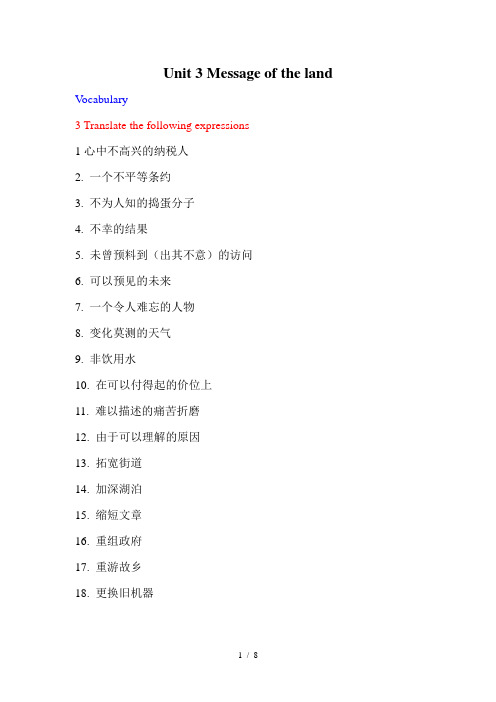
Unit 3 Message of the land V ocabulary3 Translate the following expressions1心中不高兴的纳税人2. 一个不平等条约3. 不为人知的捣蛋分子4. 不幸的结果5. 未曾预料到(出其不意)的访问6. 可以预见的未来7. 一个令人难忘的人物8. 变化莫测的天气9. 非饮用水10. 在可以付得起的价位上11. 难以描述的痛苦折磨12. 由于可以理解的原因13. 拓宽街道14. 加深湖泊15. 缩短文章16. 重组政府17. 重游故乡18. 更换旧机器1. represent, represented2. employer, unemployed, employees, reemployed3. well-informed, information4. informer, inform, authorities5. complaints, complain, unemployment6. insult7. insulting, insult8. representative9. be insulted2 Complete the following verb + noun collocations or expressions1 mind (his own business)2 plant / grow / harvest / reap (the rice)3 dig / sink (a well)4. (catch) fish / birds / crabs / mice/ a thief / a cold / the meaning / the disease5 till / improve / conserve (the soil)6 plough (the field)7 (condemn) the enemy / the killings8 (attract) attention / interest / criticism9 (gather) flowers/ nuts / information /troopsaccording to the patterns given in bold.1 it was fate。
3 message of the Land
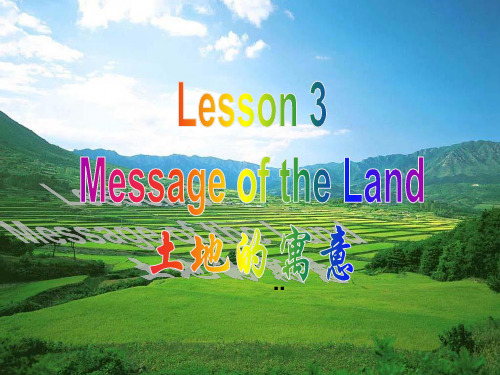
Part 2: The farmer‟s speech (para. 8 - 11) The farmer tells us what he thinks are the roots of all evils. He also tells us what joys he finds in life and in farming.
8
About the Text
Structure
Part 1: The wife‟s speech (para. 1- 3 ) The wife tells us briefly about each member of her family and how all her children left. (para.4 - 7 ) This part focuses on the changes that she finds she can’t adjust to.
craft: 职业;手工业;手艺 To learn the craft of woodcarver Needlecraft handicraft Aircraft Spacecraft Crafty: adj As crafty/cunning as a fox Craftsman 技工 Craftsmanship手艺
About the Text Figures of Speech
1.Simile: A simile is a brief comparison , usually
introduced by the preposition “like” or the conjunction “as”, as ... as, than , as if , as (明喻) though and etc. Eg: -O my love‟s like a red, red rose. ---Robert Burns
Unit 9 Message of the Land课件
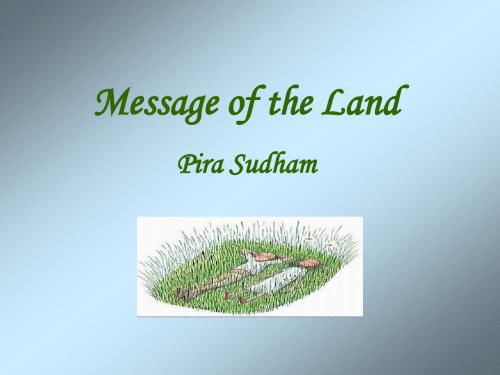
Pira Sudham
Message of the Land
Pira Sudham
• About the Author:
background / works /comments / map
• About the Text
figures of speech / word study / understanding
• He has lived for over ten years in Australia and the United Kingdom, where he wrote Monsoon Country (1988), and its sequel, The Force of Karma (2002).
About the Author
• Pira Sudham‟s literary works are concerned with socialeconomic-political changes occurring in Thailand. Widely read and highly acclaimed, his books have given a voice to the poor and the voiceless. • Considered Thailand„s leading English language writer, he was nominated(提名) for the 1990 Nobel prize for literature.
About the Author
Monsoon Country It depicts the problems of social transition in present day Thailand and gives insights into Thai life in the rural northeast. It is set in Thailand, England and Germany to convey the cultural tension between the East and the West, the clashes between the new powers and the old values, covering the span of 25 years of the socio-economic and political changes occurring in Thailand.
Unit Three Message of the Land
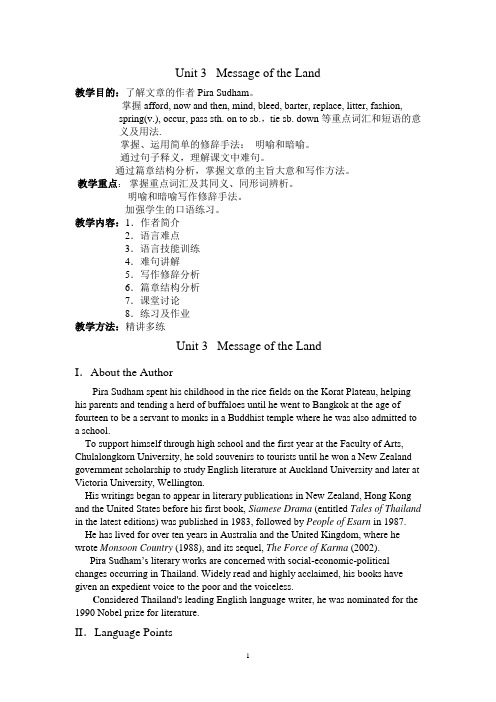
Unit 3 Message of the Land教学目的:了解文章的作者Pira Sudham。
掌握afford, now and then, mind, bleed, barter, replace, litter, fashion,spring(v.), occur, pass sth. on to sb.,tie sb. down等重点词汇和短语的意义及用法.掌握、运用简单的修辞手法:明喻和暗喻。
通过句子释义,理解课文中难句。
通过篇章结构分析,掌握文章的主旨大意和写作方法。
教学重点:掌握重点词汇及其同义、同形词辨析。
明喻和暗喻写作修辞手法。
加强学生的口语练习。
教学内容:1.作者简介2.语言难点3.语言技能训练4.难句讲解5.写作修辞分析6.篇章结构分析7.课堂讨论8.练习及作业教学方法:精讲多练Unit 3 Message of the LandI.About the AuthorPira Sudham spent his childhood in the rice fields on the Korat Plateau, helping his parents and tending a herd of buffaloes until he went to Bangkok at the age of fourteen to be a servant to monks in a Buddhist temple where he was also admitted to a school.To support himself through high school and the first year at the Faculty of Arts, Chulalongkorn University, he sold souvenirs to tourists until he won a New Zealand government scholarship to study English literature at Auckland University and later at Victoria University, Wellington.His writings began to appear in literary publications in New Zealand, Hong Kong and the United States before his first book, Siamese Drama (entitled Tales of Thailand in the latest editions) was published in 1983, followed by People of Esarn in 1987. He has lived for over ten years in Australia and the United Kingdom, where he wrote Monsoon Country (1988), and its sequel, The Force of Karma (2002).Pira Sudham’s literary works are concerned with social-economic-political changes occurring in Thailand. Widely read and highly acclaimed, his books have given an expedient voice to the poor and the voiceless.C onsidered Thailand's leading English language writer, he was nominated for the 1990 Nobel prize for literature.II.Language Points1) marry: vt./vi.They married young.John is going to marry Jane.marry sb offmarried: a. married to sb.He is married to a famous writer.married to sth.:dedicated to sthHe is whole-heartedly married to his work.marriage: n.2) afford to: can / could be able + afford sth /to do sthThey walked because they couldn’t afford (to take) taxi.I mustn’t annoy my boss because I can’t afford to lose my job.3)now and then: now and again; occasionallyhere and there: everywhereups and downs: alternate good and bad luckthe ins and outs: the details and complexities (of sth)4)in spite (n. ) of: (used as a prep.) not being prevented by; regardless of; despite They went out in spite of the rain.regardless (adv.) of: (used as a prep.) (infml) paying no attention toShe carried on regardless of the danger.despite (prep.): without being affected byThey had a wonderful holiday, despite the bad weather.5)mind one’s own…mind one’s own business: not interfere in other people’s affairmind one’s own p’s and q’s: be careful and polite about what one says or does 6)bleed: v. (bled; bled) loose or emit bloodbleed to deathbleed for sth: suffer wounds or d ie (for a cause ,one’s country)bleed for revolutionbleed sb for sth: (infml) extort (money) from sbThe blackmailer bled him for every penny he had.7)barter: v./ n. exchange (goods, property, etc) for other goods, etc without using moneybarter sth for sth: barter wheat for machinerybarter with sb for sth:The prisoners tried to barter with the guards for their freedom.replace: v. ---put back in its placereplace the book on the shelf---take the place ofCan anything replace a mother’s love?---provide a substitute for sb / sthreplace a broken window with a new one8)litter: n. light rubbish(eg. bits of paper, wrappings, bottles)Please do not leave litter.v.make untidy with scattered rubbishNewspapers littered the floor.9)fashion: n.in / after the fashion of sb: (fml) like sbShe paints in the fashion of Picasso.come into / be in fashion: become or be populargo / be out of fashion: become outdatedfashionable: a.old-fashioned: a.10)hairdresser:n.beautician: n.barber: n.11)spring: v. jump p from the ground in a single movement spring out of bedA cat sprang out of the bushes.spring to life: suddenly become activeOn hearing his name called, the sleeping dog sprang to life.come / spring to mind: present itself to one’s thoughtsNothing immediately springs to mind.spring from sth: have sth as a source or originHatred often springs from fear.spring up: appear, develop, grow, etc. quickly or suddenlyNew houses were springing up all over the town.12)a bag of bones: a very thin person or animalThe cat was just a bag of bones.bag and baggage: with all one’s belongings, often suddenly or secretly Her tenant left, bag and baggage, without paying the rent.be in the bag: (of an result, outcome) be as desiredHer re-election is in the bag.pack one’s bags: (prepare to) leaveHe was told to pack his bags.13)occur: v. come into being as an event or a process; happen Death occurred at midnight, the doctor says.occur to sb: come into (a person’s mind)An idea has occurred to me.Did it ever occur to you to think of him?It never occurred to her that she should be on time.occurrence: n. event; incident, happeningincident: n. unimportant or minor things happenedevent: n. a happening of importance14)rag: n. torn, frayed, odd clothI use an oily rag to clean my bike.rags: (pl.) old, worn or torn clothesHe gave five dollars to a tramp dressed in rags and tatters.15)tie sb down to sth: restrict sb to certain conditionsChildren d o tie you down, don’t they?tie sb up: ---bind sb with rope, etc so that he cannot move or escape--- (use passive) occupy sb so that he has no time for other thingsI’m tied up in a meeting until 3 p.m..16)pass sth on to sb: hand or give sth to sb else, esp after receiving or using it oneselfI passed her message on to her mother.Pass the book on to me when you’ve finished with it.pass sth down: (esp passive) pass sth from one generation to the nextWe gained much knowledge which has been passed down over centuries.pass sth up: (infml) refuse to accept a chance, an opportunity, etc.Imagine passing up an offer like that!III.Language Skills Practice用afford, now and then, mind, bleed, barter, replace, litter, fashion, spring(v.), occur, pass sth. on to sb.,tie sb. down及相关短语编写/讲述一个小故事。
现代大学英语 Unit 3 message of the land
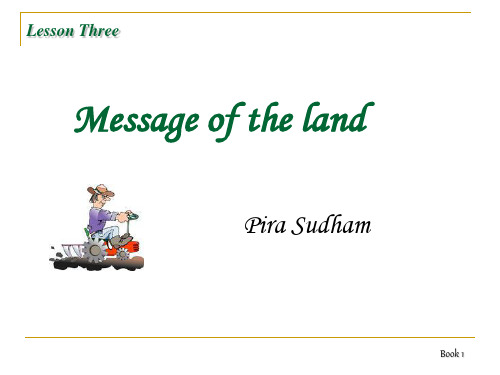
Why, in my eyes, do tears always well up? Because my love for the land is so deep...
Film clips
Lesson 3-Message of the Land
Land is the only thing in the world that amounts to anything, for it's the only thing in this world that lasts. It's the only thing worth working for, worth fighting for.
Go
About the Author
Tales of Thailand
Out of the relocation of millions of people in the path of dam constructions and eucalyptus plantations, the suppression of wages and the price of agricultural produce, the forceful drive to gain more land to grow eucalyptus trees, the corruption, prostitution, child trade, slave labour, the horror of the Thailand-Burma Death Railway during the World War II, the economic crisis in July 1997, the war to win the people in impoverished Esarn in the seventies and the daily grind in the Mother of Gridlock – Bangkok come tales of hope and tales of woe , tales of acceptance and tales of the struggle for survival that become Tales of Thailand.
unit3 the message of the land
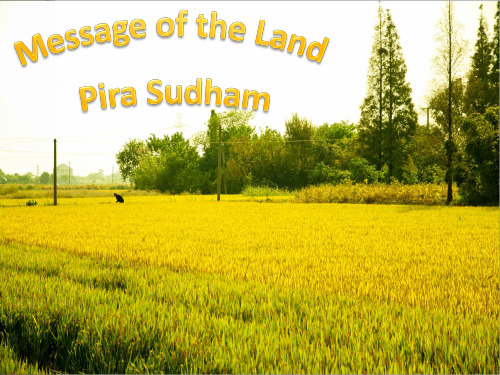
3
material in the top layer of the surface of the earth in which plants can grow 土地 territory over which rule or control is exercised国土 the solid part of the earth's surface陆地
7
About the Author
His writings began to appear in literary publications in New Zealand, Hong Kong and the United States before his first book, Tales of Thailand was published in 1983, followed by People of Esarn in 1987. He has lived for over ten years in Australia and the United Kingdom, where he wrote Monsoon Country (1988), and its sequel, The Force of Karma (2002). Pira Sudham is the Thai author writing in English who was nominated for the 1990 Nobel Prize for Literature. His novel and short stories provide insights into Thai life, particularly that of rural 8 northeast Thailand.
UNIT3 Message of the Land - WORDS

People of Esarn
Foreign writers writing about the Thai people look at Thailand from the outside, but Pira Sudham writes about his people and country as seen from the inside. This is one of the things that makes them so fascinating.
Author
His Life
• Born in a remote Esarn village in Thailand • First language: Lao • Temple boy in Bangkok at 14 • Thailand’s top university • Scholarship to New Zealand to study English • 30-year odyssey through New Zealand, Australia, Hong Kong, the UK, Germany, and Switzerland • Retired to a solitary life in his home village in 1997, helping needy students and teachers in a private school with funds set up by himself
complain VERB
• to say that you are not satisfied with it; to express dissatisfaction • Mary is always complaining. • Faculty members complain that their students are unprepared to do college-level work. • The American couple complained about the high cost of visiting Europe... • For my own part, I have nothing to complain of... • I’m going to complain to the manager about your service. • 'I do everything you ask of me,' he complained.
- 1、下载文档前请自行甄别文档内容的完整性,平台不提供额外的编辑、内容补充、找答案等附加服务。
- 2、"仅部分预览"的文档,不可在线预览部分如存在完整性等问题,可反馈申请退款(可完整预览的文档不适用该条件!)。
- 3、如文档侵犯您的权益,请联系客服反馈,我们会尽快为您处理(人工客服工作时间:9:00-18:30)。
The Force of Karma This sequel to Monsoon Country covers the tumultuous (骚乱的) years of the economic crisis, the political upheavals and the massacre of May 1992, right up to the beginning of the year 2002.
The text begins with a word 'yes', What kind of writing is it?
Sophia Li
About the Text Figures of Speech
Simile: A simile is a brief comparison , usually : (明喻) 明喻)
Sophia Li
His writings began to appear in literary publications in New Zealand, Hong Kong and the United States before his first book, Siamese Drama (entitled Tales of Thailand in the latest editions) was published in 1983, followed by People of Esarn in 1987. He has lived for over ten years in Australia and the United Kingdom, where he wrote Monsoon Country (1988), and its sequel [后续], The Force of Karma (2002).
Sophia Li
Pira Sudham's literary works are concerned with social-economic-political changes occurring in Thailand. Widely read and highly acclaimed, his books have given a voice to the poor and the voiceless. Considered Thailand's leading English language writer, he was nominated(提名) for the 1990 Nobel prize for literature.
About the Author
Pira Sudham spent his childhood in the rice fields on the Korat Plateau, helping his parents and tending a herd of buffaloes until he went to Bangkok at the age of fourteen to be a servant to monks in a Buddhist temple where he was also admitted to a school. To support himself through high school and the first year at the Faculty of Arts, Chulalongkorn University, he sold souvenirs to tourists until he won a New Zealand government scholarship to study English literature at Auckland University and later at Victoria University, Wellington.
This part focuses on the changes that Part 2: The farmer's speech she finds she can't adjust to.
(para. - 11)
4
7
8
The farmer tells us what he thinks are the roots of all evils. He also tells us what joys he finds in life andSophia Li in farming.
Sophia Li
About the Author
Pira Sudham's Own Words: ---"If I had not left my village then, I would have been subject, like most villagers, to the mercy of nature: floods, drought, disease, ignorance and scarcity. With endurance, I would have accepted them as my own fate, as something I cannot go against in this life."
Sophia Li
About the Text Figures of Speech
Examples:
subject / tenor Records (fell) The data processing (is going on) simile marker like as (slow) as reference/ vehicle ripe apples (on a windy day). a snail
LOGO
Message of the Land
Pira Sudham
Sophia Li
Contents
1 2 3 4
Background and author
Structure
Vocabulary and sentences
Text understanding &discussion
Sophia Li
Sophia Li
About the Text Figout the Author
Others' Comments: ---"Pira Sudham has given a voice to the poor of Thailand." ---"Pira Sudham is undoubtedly one of the foremost Thai writers of today, a formidable vivisector (令人敬畏的活 体解剖者) to reveal the hidden aspects of Thai society."
Sophia Li
About the Author
People of Esarn Pira Sudham conveys the inner voices of his subjects regardless of how illiterate, timid and insignificant they seem in their daily lives. Their simplicity and sensitivity come through his direct and clear prose, yet moving and touching. He writes with understanding and compassion for his people. Foreign writers writing about the Thai people look at Thailand from the outside, but Pira Sudham writes about his people and country as seen from the inside. This is one of the things that makes them so fascinating.
Sophia Li
Monsoon Country It depicts the problems of social transition in present day Thailand and gives insights into Thai life in the rural northeast. It is set in Thailand, England and Germany to convey the cultural tension between the East and the West, the clashes between the new powers and the old values, covering the span of 25 years of the socio-economic and political changes occurring in Thailand.
introduced by the preposition "like" or the conjunction "as", and etc.
A simile consists of two parts: tenor and vehicle. The tenor is the primary subject; the vehicle is the thing to which the main subject is compared to.
Sophia Li
About the Author
Pira Sudham's own words: --- "In my mind I carry memories of childhood, of life in villages, much as a pregnant woman carrying a child. Every day these images grow, and I know that one day I shall have to give birth to them through the medium of writing. Besides, I don't want people in our villages, so far removed from other peoples because of distance and poverty, to be born, suffer and to die in vain."
